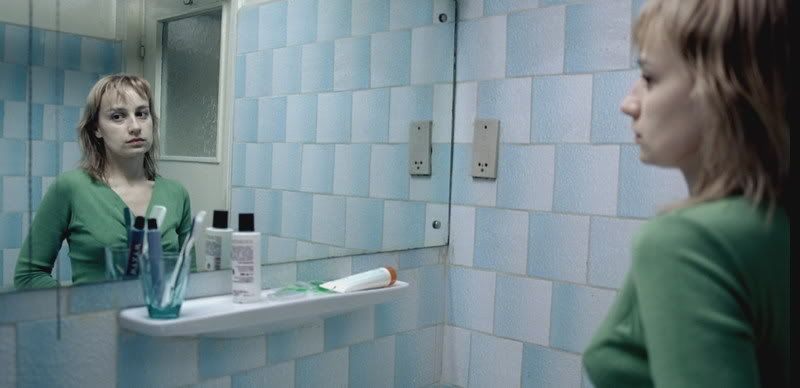
Top ten lists are meaningless. Speaking from a true fiend for end of the year top ten lists, they never have the permanence they wish to pronounce. The other week I stumbled upon my top ten list from years past and it made me wonder if those films were truly the best representation of film that year. Some yes, others obviously no, but more importantly, it affirmed the idea that the maker of the list is always more than welcome to revise that list. I'd hate to assign a number to one particular film that wasn't on my 2007 list because the next time I have to profess the best of the best and the number frustratingly eludes me, I'll smack myself on the head for placing it at seven or thirteen, therefore I will say Cristian Mungiu's "4 Months, 3 Weeks and 2 Days" belongs in the overall canon of the best of 2007. Due to a limited release that never included my city, I wasn't able to see the movie until last week when it was released on DVD. It was more than worth the wait.
A.O. Scott of The New York Times has ruminated before on the supposed New Wave happening currently in Romanian cinema. What exactly denotes a New Wave? Is it a group of filmmakers of the same generation consciously or unconsciously making films that reflect their culture, nation's politics, gender issues, and history? If so, we can look to filmmakers like Mungiu, Cristi Puiu, Corneliu Porumbiu, among others, who in recent years have been making films that have a certain look and mood to them. My first attempt to penetrate this world was Cristi Puiu's "The Death of Mr. Lazarescu", a film so bleak and harsh about the bowels of the Romanian healthcare system, that I found it difficult to finish. The story occurs in the span of just one night, a night that is a virtual tour in hospital hell for a man without insurance or available bedside manor. It's unnerving, sad, dark, and for a movie filled with such jolting images, it leisurely takes it time to unravel the complicated world of a man on the verge of dying and being turned away for treatment. Mungiu's film, "4 Months", is no less of a joy ride as we watch a woman help and deal with her friend's illegal abortion.
What sticks from Mungiu's film is the unexpected narrative device of following the friend (Otilia) of the woman (Gabita) who had the abortion, not choosing to exploit the recipient for dramatic purposes. There are many moments that smack the viewer in the face in their grim reality, but for the most part Mungiu is more curious about the psychology of his characters, not their physical actions. Taking away the most sympathetic character for a majority of the film and replacing her with the friend that helped organize and produce the abortion is such bold and brilliant move, that you wonder why no one else has ever thought of it before. They haven't and thus the morality play of an abortion becomes much more complicated because so often we think of the woman receiving the abortion as the one that has the only one that has to emotionally and psychologically process the experience (which she totally does), but what about others that might be involved in the equation? It's a fascinating question that thankfully Mungiu never answers not out of ambivalence, but his proposition is best left up to the audience and their own warring opinions about a woman's right to choose. Yes, the film involves an abortion and yet it's also not about abortion. Choices, consequences, humanity, decency, good vs. evil, these are all classic elements of storytelling, but Mungiu makes them fresh and invigorating in such a challenging piece of work.
I don't want to give away too much for those of you who have not been fortunate enough to see the film, but aside from the content, Mungiu constructs such daring and concise shots that there's clear evidence a true filmmaker is on the cusp of a promising career. Shot mostly in handheld, there are scenes that are very evenly composed such as a chilling scene in which Otilia briefly leaves Gabita to join her boyfriend's mother's birthday party. She sits center frame quietly and still, her brain going over every nightmarish scenario that could possibly be happening to her ailing friend. It's more potent than any of the film's more gruesome scenes. The film works in a controlled nightmare sort of way. A dream of a nasty process that no one should have endure, but Mungiu creates such beautiful images of such an ugly event that a delicate balance exists. Exploitation this not, electric filmmaking is more accurate. Such a film doesn't deserve quantification. A list is just a list, right?
Friday, June 20, 2008
could have been a contender
Subscribe to:
Post Comments (Atom)



No comments:
Post a Comment